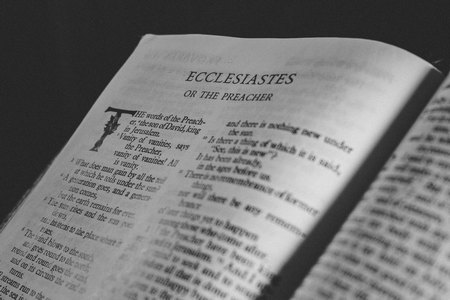The Words Of The Preacher

After years of studying God’s Word, I am still amazed at the depth of knowledge that is contained therein. Even though it has been almost two thousand years since Its completion, the Bible is just as relevant as if it were written today. The New Testament instructs modern man how that he should live during the Christian dispensation of time. The Old Testament, although fulfilled and taken out of the way, is still wonderfully useful in the areas of example and learning. Speaking of the Old Testament, Paul wrote, “For whatsoever things were written aforetime were written for our learning, that we through patience and comfort of the scriptures might have hope” (Rom. 15:4). With that in mind, let us delve into the Old Testament to examine the subject of life and its purpose.
Over the years, Ecclesiastes has become one of my favorite studies of all inspired writings. The book begins with the statement, “The words of the Preacher, the son of David, king in Jerusalem” (Eccl. 1:1). This is largely accepted to be a reference to Solomon. The next two verses establish the main focus for the rest of the book. We find, ”Vanity of vanities, saith the Preacher, vanity of vanities; all is vanity. What profit hath a man of all his labour which he taketh under the sun” (Eccl. 1:2-3)? To put it another way, “the Preacher” is acknowledging that all earthly, physical endeavors are basically empty and do not endure. No matter how much physical work a man does, he is not able to keep that which he accumulates. It is said, “One generation passeth away, and another generation cometh: but the earth abideth for ever” (Eccl. 1:4). How true those statements are. As we all grow, we are able to witness the transition from youth to aged. The man who at one time was strong and vibrant becomes the feeble and listless. “The Preacher” was so bothered by this that he wrote, “Yea, I hated all my labour which I had taken under the sun: because I should leave it unto the man that shall be after me. And who knoweth whether he shall be a wise man or a fool? yet shall he have rule over all my labour wherein I have laboured, and wherein I have shewed myself wise under the sun. This is also vanity. Therefore I went about to cause my heart to despair of all the labour which I took under the sun” (Eccl. 2:18-20). Literally every physical possession that man has on Earth is only temporary in nature. As the old saying goes, “you can’t take it with you”. So what is the purpose of living? This is a question that “the Preacher” wanted to answer.
Some might begin to believe that life has no purpose. Why do we work? Why do we suffer? Why do we live? At one point, because of the hardness of life, “the Preacher” believed it was better to be dead than alive. “So I returned, and considered all the oppressions that are done under the sun: and behold the tears of such as were oppressed, and they had no comforter; and on the side of their oppressors there was power; but they had no comforter. Wherefore I praised the dead which are already dead more than the living which are yet alive” (Eccl. 4:1-2). His observations of life were so dismal that life seemed almost pointless. Unfortunately, that is the way that so many think of life today. They become so angry and bitter with what happens around them that they come away with the mindset that life should only be about pleasing the physical senses. That is the hole in which many find themselves trapped. They see no real purpose, and therefore they see no problem with engaging in whatever actions they desire. Many seemingly ignore, or reject, the idea that there is more to man than physical existence. By doing such, they never are able to come away with real understanding about life and its meaning.
It was after much examination and experimentation, that “the Preacher” was able to learn the answer to his query. His findings were as follows: “Vanity of vanities, saith the preacher; all is vanity. And moreover, because the preacher was wise, he still taught the people knowledge; yea, he gave good heed, and sought out, and set in order many proverbs. The preacher sought to find out acceptable words: and that which was written was upright, even words of truth…Let us hear the conclusion of the whole matter: Fear God, and keep his commandments: for this is the whole duty of man. For God shall bring every work into judgment, with every secret thing, whether it be good, or whether it be evil” (Eccl. 12:8-14). By seeking those things that are temporary, man will never find true meaning and happiness. Instead, man should recognize that he has an immortal soul. By reverencing and obeying God, he is fulfilling his true purpose.
~ Corey Barnette


